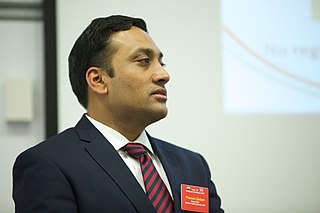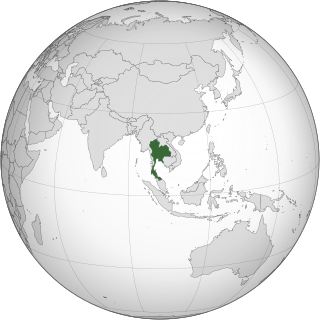Related Research Articles

Squatting is the action of occupying an abandoned or unoccupied area of land or a building, usually residential, that the squatter does not own, rent or otherwise have lawful permission to use. The United Nations estimated in 2003 that there were one billion slum residents and squatters globally. Squatting occurs worldwide and tends to occur when people find empty buildings or land to occupy for housing. It has a long history, broken down by country below.

The Directorate General of Forces Intelligence, commonly known by its acronym DGFI, is the defense intelligence agency of the Bangladesh Armed Forces, tasked with collection, collation and evaluation of strategic and topographic information, primarily through human intelligence (HUMINT). As one of the principal members of the Bangladesh intelligence community, the DGFI reports to the Director-General under the executive authority of the head of government, the Prime Minister, and is primarily focused on providing intelligence for the Prime Minister, the Cabinet of Bangladesh, and the Armed Forces of Bangladesh.
Orangi is a municipality approximately 57 square kilometres (22 sq mi) in an area that forms much of the northwestern part of Karachi in Sindh, Pakistan. When grouped with the neighboring municipality of Baldia Town, the Orangi-Baldia population is estimated to be over 2.4 million.
Jockin Arputham was an Indian community leader and activist, known for his campaigning work of more than 40 years on issues related to slums and shanty towns. He was born in Karnataka, India and moved to Mumbai, where he quickly became politicized and established himself as a community leader. In 2014, he was nominated for the Nobel Peace Prize, alongside the organisation he helped to found, Slum Dwellers International. In 2011, he received the Padma Shri in New Delhi for his contributions to social work, presented by the President of India.

Smokey Mountain was the term coined for a large landfill once located in Tondo, Manila.

The Directorate General of National Security Intelligence, commonly known as the NSI, is the principal civilian intelligence agency of the People's Republic of Bangladesh. The NSI's headquarters is in 1 Segunbagicha, Dhaka, Bangladesh. The NSI is the leading body of the Government of Bangladesh in the field of internal security, counter terrorism, counter intelligence and foreign intelligence. NSI is the largest among the intelligence agencies in Bangladesh, the others being the Directorate General of Forces Intelligence (DGFI), SB, CID, PBI and intelligence directorates of armed and paramilitary forces. The agency stands under the direct authority of the Prime Minister of Bangladesh.

Immigration to Pakistan is the legal entry and settlement of foreign nationals in Pakistan. Immigration policy is overseen by the Interior Minister of Pakistan through the Directorate General Passports. Most immigrants are not eligible for citizenship or permanent residency, unless they are married to a Pakistani citizen or a Commonwealth citizen who has invested a minimum of PKR 5 million in the local economy.

Mirza Fakhrul Islam Alamgir is a Bangladeshi politician. He has been the secretary general of the Bangladesh Nationalist Party (BNP) since 2016. He was a member of the parliament for Thakurgaon-1 constituency from 2001 to 2006. In that term, he was also appointed as the Minister of State in charge of the Ministry of Agriculture and later Ministry of Civil Aviation and Tourism.

Illegal housing in India consists of huts or shanties built on land not owned by the residents and illegal buildings constructed on land not owned by the builders or developers. Although illegal buildings may afford some basic services, such as electricity, in general, illegal housing does not provide services that afford for healthy, safe environments.
The Armed Forces Division (AFD) is the principal national command authority for national defense of the People's Republic of Bangladesh. The command and control of the Bangladesh Armed Forces is exercised in this division, under direct control and supervision by the prime minister, who is also in charge of Ministry of Defence. Lieutenant General Mizanur Rahman Shamim is the present Armed Forces Division's Principal Staff Officer. The headquarter is located in Dhaka Cantonment.
Aasim Sajjad Akhtar is a teacher, left wing politician and columnist based in Pakistan. Akhtar is associate professor of political economy at Quaid-i-Azam University, Islamabad, Pakistan. He served as the president of the Awami Workers Party's Punjab executive committee from March 16, 2014 to January 17, 2020. He is deputy general secretary of Awami Workers Party.

Even though mathematically more housing than needed is produced in Egypt resulting in millions of vacant homes, large portions of its residents live in inadequate housing that may lack secure tenure, safe drinking water and wastewater treatment, are crowded or are prone to collapse, as better housing is widely unaffordable. While there is also a problem with homelessness especially amongst children.
In early March 2017, thousands of members of the group Kalipunan ng Damayang Mahihirap and other informal settlers illegally occupied an idle housing project of the National Housing Authority (Philippines) (NHA), in Pandi, Bulacan, in the Philippines.

The Government agencies in Bangladesh are state controlled organizations that act independently to carry out the policies of the Government of Bangladesh. The Government Ministries are relatively small and merely policy-making organizations, allowed to control agencies by policy decisions. Some of the work of the government is carried out through state enterprises or limited companies.

Kutupalong refugee camp is the world's largest refugee camp. It is located in Ukhia, Cox's Bazar, Bangladesh, and is inhabited mostly by Rohingya refugees who fled from ethnic and religious persecution in neighboring Myanmar. It is one of two government-run refugee camps in Cox's Bazar, the other being the Nayapara refugee camp.
National Telecommunication Monitoring Centre is a national-level intelligence agency of Bangladesh responsible for monitoring, collecting, and recording information and communication data. It is also responsible for the interception of electronic communication such as phone calls, emails, and social media accounts.

Dr Praveen Gedam is an Indian bureaucrat. He is a 2002 batch Indian Administrative Service officer of Maharashtra cadre.

Urban areas in the Philippines such as Metro Manila, Metro Cebu, and Metro Davao have large informal settlements. The Philippine Statistics Authority defines a squatter, or alternatively "informal dwellers", as "One who settles on the land of another without title or right or without the owner's consent whether in urban or rural areas". Squatting is criminalized by the Urban Development and Housing Act of 1992, also known as the Lina Law. There have been various attempts to regularize squatter settlements, such as the Zonal Improvement Program and the Community Mortgage Program. In 2018, the Philippine Statistics Authority estimated that out of the country's population of about 106 million, 4.5 million were homeless.

Squatting in Bangladesh occurs when squatters make informal settlements known as "bastees" on the periphery of cities such as Chittagong, Dhaka and Khulna. As of 2013, almost 35 per cent of Bangladesh's urban population lived in informal settlements.

Squatting in Thailand was traditionally permissible under customary law and adverse possession can occur after ten years of continuous occupation. As of 2015, the capital Bangkok had over 2 million squatters, out of a population of around 10 million. A survey of slums across the country noted in 2000 that most were rented not squatted; Khlong Toei District in Bangkok contains both squatters and tenants. There are also squatters in rural areas. The 1975 Agricultural Land Reform Act aimed to redistribute land to poor people under the Sor Por Kor program and as of 2019, 36 million rai of land had been assigned.
References
- ↑ "Govt to build more houses for slum people". The Daily Star. 5 August 2015. Retrieved 28 June 2019.
- ↑ "Govt housing projects in two districts in progress". The Daily Star. 15 November 2010. Retrieved 28 June 2019.
- ↑ "National Housing Authority\". nha.gov.bd. NHA. Archived from the original on 28 June 2019. Retrieved 28 June 2019.
- ↑ "Govt housing projects in two districts in progress". The Daily Star. 15 November 2010. Retrieved 28 June 2019.
- ↑ "Bhasantek Slums: Thousands evicted in NHA drive". The Daily Star. 20 February 2019. Retrieved 28 June 2019.
- ↑ "National Housing Authority implementing 34 projects". theindependentbd.com. Retrieved 28 June 2019.
- ↑ "Abuse of power: Ex-joint secy gets 5-yr jail". The Daily Star. 30 January 2019. Retrieved 28 June 2019.